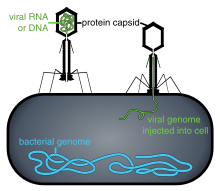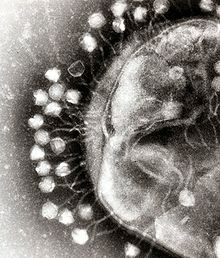Phage Therapy
Phage therapy, viral phage therapy, or phagotherapy is the therapeutic use of bacteriophages to treat pathogenic bacterial infections.[1] Bacteriophages, known as phages, are a form of viruses.[2] Phages attach to bacterial cells, and inject a viral genome into the cell.[3] The viral genome effectively replaces the bacterial genome, halting the bacterial infection.[3] The bacterial cell causing the infection is unable to reproduce, and instead produces additional phages.[2] Phages are very selective in the strains of bacteria they are effective against.[3] Advantages include reduced side-effects and reduced risk of the bacterium's developing resistance.[3] Disadvantages include the difficulty of finding an effective phage for a particular infection.[3] However, virulent phages can be isolated much more quickly than other compounds and natural products due to the fact that they can be isolated from the environment with ease.[4] In addition to this, development of standardized manufacturing processes would make lab to clinic delivery of phages much quicker. [5]
 |
| Phage injecting its genome into bacterial cell |
 | |
|
Phages are often compared to antibiotics. Phages tend to be more successful than antibiotics where there is a biofilm covered by a polysaccharide layer, which antibiotics typically cannot penetrate.[6] Bacteriophages are much more specific than antibiotics.[3] They are typically harmless not only to the host organism but also to other beneficial bacteria, such as the gut microbiota, reducing the chances of opportunistic infections.[7] They have a high therapeutic index, that is, phage therapy would be expected to give rise to few side effects, even at higher-than-therapeutic levels. Because phages replicate in vivo (in cells of living organism), a smaller effective dose can be used.[8]
This specificity is also a disadvantage: a phage will kill a bacterium only if it matches the specific strain.[3] Consequently, phage mixtures ("cocktails") are often used to improve the chances of success.[citation needed] Alternatively, samples taken from recovering patients sometimes contain appropriate phages that can be grown to cure other patients infected with the same strain.[citation needed]
Phages are currently being used therapeutically to treat bacterial infections that do not respond to conventional antibiotics, particularly in Russia[9] and Georgia.[10][11][12] There is also a phage therapy unit in Wrocław, Poland, established in 2005, the only such centre in a European Union country.[13] Phages are the subject of renewed clinical attention in western countries, such as the United States. In 2019, the United States Food and Drug Administration approved the first US clinical trial for intravenous phage therapy.[14]
Phage therapy has many potential applications in human medicine as well as dentistry, veterinary science, and agriculture.[15] If the target host of a phage therapy treatment is not an animal, the term "biocontrol" (as in phage-mediated biocontrol of bacteria) is usually employed, rather than "phage therapy".
.png)
Comments